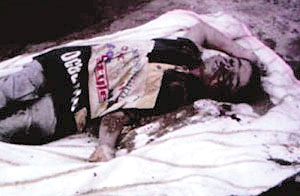The greatest lies told about the war on Iraq are of course the lies about Saddam Hussein’s ties with Al Quida and his massive arsenal of weapons of mass destruction, lies that even at the time were hard to swallow and today only persist in hardcore Bushian circles and in the delusion bunker that is the Bush White House itself.
To cover up these lies in the aftermath of the invasion, once it became clear just how big those lies were and how little truth was in them, a new lie had to be invented. People like Tony Blair could no longer pretend to believe the prewar reports and instead resorted to a meta lie: “we misunderestimated the amounts of WMDs Iraq had, but everybody did” and “not just American and British intelligence was faulty, but the German and French intelligence services said the same things”.
The first charge is so much self serving nonsense. From the start, many if not most of the people against the war were sceptical about Saddam’s stash of WMDs — I know I was. And we had the support of people like Scott Ritter, the ex-weapons inspector who before the war made it clear these allegations were nonsense. The second claim is harder to reject, as funnily enough most intelligence services are reticent to talk about their work; you never know what information these services have that we do not. It makes it therefore easy for Blair to claim that they supported him before the war, that “we were all fooled” and that nobody is
to blame for this faulty intelligence.
Not anymore. The various investigations into the workings of MI5 and such in the wake of the death of Dr. David Kelly had already made much nonsense of Blair’s claims, but the final nail in the coffin might come from this report by the LA Times which shows that the CIA deliberately misrepresented German intelligence on Iraqi WMDs:
BERLIN — The German intelligence officials responsible for one of the most important informants on Saddam Hussein’s suspected weapons of mass destruction say that the Bush administration and the CIA repeatedly exaggerated his claims during the run-up to the war in Iraq.
Five senior officials from Germany’s Federal Intelligence Service, or BND, said in interviews with The Times that they warned U.S. intelligence authorities that the source, an Iraqi defector code-named Curveball, never claimed to produce germ weapons and never saw anyone else do so.
According to the Germans, President Bush mischaracterized Curveball’s information when he warned before the war that Iraq had at least seven mobile factories brewing biological poisons. Then-Secretary of State Colin L. Powell also misstated Curveball’s accounts in his prewar presentation to the United Nations on Feb. 5, 2003, the Germans said.
Curveball’s German handlers for the last six years said his information was often vague, mostly secondhand and impossible to confirm.
“This was not substantial evidence,” said a senior German intelligence official. “We made clear we could not verify the things he said.”
The German authorities, speaking about the case for the first time, also said that their informant suffered from emotional and mental problems. “He is not a stable, psychologically stable guy,” said a BND official who supervised the case. “He is not a completely normal person,” agreed a BND analyst.
Worse, those within the CIA who questioned this intelligence were ignored and punished for their views:
An investigation by The Times based on interviews since May with about 30 current and former intelligence officials in the U.S., Germany, England, Iraq and the United Nations, as well as other experts, shows that U.S. bungling in the Curveball case was worse than official reports have disclosed.
The White House, for example, ignored evidence gathered by United Nations weapons inspectors shortly before the war that disproved Curveball’s account. Bush and his aides issued increasingly dire warnings about Iraq’s biological weapons before the war even though intelligence from Curveball had not changed in two years.
At the Central Intelligence Agency, officials embraced Curveball’s account even though they could not confirm it or interview him until a year after the invasion. They ignored multiple warnings about his reliability before the war, punished in-house critics who provided proof that he had lied and refused to admit error until May 2004, 14 months after the invasion.

One of the victims that need not have died if these people had done their job before the war.
Which leaves one important question: why did the German intelligence services or those CIA people who questioned Curveball not come forward before the war, when it might have done some good? You might also ask why the LA Times couldn’t have mounted this investigation then, come to think of it. Some 100,000 Iraqi people might still be alive if either party had deigned to blow the whistle earlier.